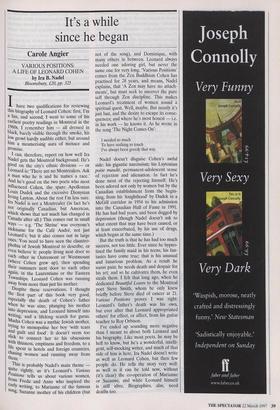It's a while since he began
Carole Angier
VARIOUS POSITIONS: A LIFE OF LEONARD COHEN by Ira B. Nadel Bloomsbury, £20, pp. 325 Ihave two qualifications for reviewing this biography of Leonard Cohen: first, I'm a fan, and second, I went to some of his earliest poetry readings in Montreal in the 1960s. I remember him — all dressed in black, barely visible through the smoke, his low growl hardly audible either, but around him a mesmerising aura of menace and promise.
I can, therefore, report on how well Ira Nadel gets the Montreal background. He's good on the city's ethnic divisions — or Leonard is: 'There are no Montrealers. Ask a man who he is and he names a race.' And he's good on the two poets who most influenced Cohen, the spare Apollonian Louis Dudek and the excessive Dionysian Irving Layton. About the rest I'm less sure. Ira Nadel is not a Montrealer (in fact he's not originally Canadian, but American, Which shows that not much has changed in Canada after all.) This comes out in small ways — e.g. 'The Shrine' was everyone's nickname for the Café Andre, not just Leonard's; but it also comes out in large ones. You need to have seen the claustro- phobia of Jewish Montreal to describe, or even believe it: people living next door to each other in Outremont or Westmount (where Cohen grew up), then spending their summers next door to each other again, in the Laurentians or the Eastern Townships. Leonard Cohen was running away from more than just his mother. Despite these reservations, I thought the first part of this book very good, especially the death of Cohen's father when he was nine, plunging his mother into depression, and Leonard himself into Writing, and a lifelong search for gums. Masha Cohen was a mythic Jewish mother, trying to monopolise her boy 'with tears al!cl guilt and food'. It doesn't seem too slick to connect her to his obsessions with thinness, emptiness and freedom, to a life spent in hotels and foreign countries, [lasing women and running away from them.
This is is probably Nadel's main theme — quite rightly, as it's Leonard's. Various Positions tells us about various women, from Freda and Anne who inspired the early writing, to Marianne of the famous s"8, Suzanne mother of his children (but not of the song), and Dominique, with many others in between. Leonard always needed one adoring girl, but never the same one for very long. 'Various Positions' comes from the Zen Buddhism Cohen has practised for 28 years, and means, Nadel explains, that 'A Zen may have no attach- ments', but must seek to uncover the pure self through Zen discipline. This makes Leonard's treatment of women sound a spiritual quest. Well, maybe. But mostly it's just lust, and the desire to escape its conse- quences; and where he's most honest — i.e. in his work — he knows it. As he wrote in the song 'The Night Comes On': I needed so much
To have nothing to touch I've always been greedy that way.
Nadel doesn't disguise Cohen's awful side: his gigantic narcissism; his Laytonian poete maudit, permanent-adolescent sense of rejection and alienation. In fact he's done most of the rejecting himself. He's been adored not only by women but by the Canadian establishment from the begin- ning, from his 'knighthood' by Dudek in a McGill corridor in 1954 to his admission into the Canadian Hall of Fame in 1991. He has had bad years, and been dogged by depression (though Nadel doesn't ask to what extent that may have been caused, or at least exacerbated, by his use of drugs, which began at the same time.) But the truth is that he has had too much success, not too little. Ever since he hypno- tised the family maid in his teens, his fan- tasies have come true; that is his unusual and luxurious problem. As a result he wants pain; he needs death and despair for his art; and so he cultivates them, he even steals them. I felt that long ago, when he dedicated Beautiful Losers to the Montreal poet Steve Smith, whom he only knew briefly before Steve died of cancer at 21. Various Positions proves I was right: Leonard's father's death was his own, but ever after that Leonard appropriated others' for effect, or affect, from his guitar teacher to Roy Orbison.
I've ended up sounding more negative than I meant to about both Leonard and his biography. Like most poets, he may be hell to know, but he's a wonderful, intelli- gent, self-mocking writer, and much of that side of him is here. Ira Nadel doesn't write as well as Leonard Cohen, but then few people do. He tells the story very well: as well as it can be told now, without (it's clear) the co-operation of Marianne or Suzanne, and while Leonard himself is still alive. Biographies, alas, need deaths too.


































































 Previous page
Previous page